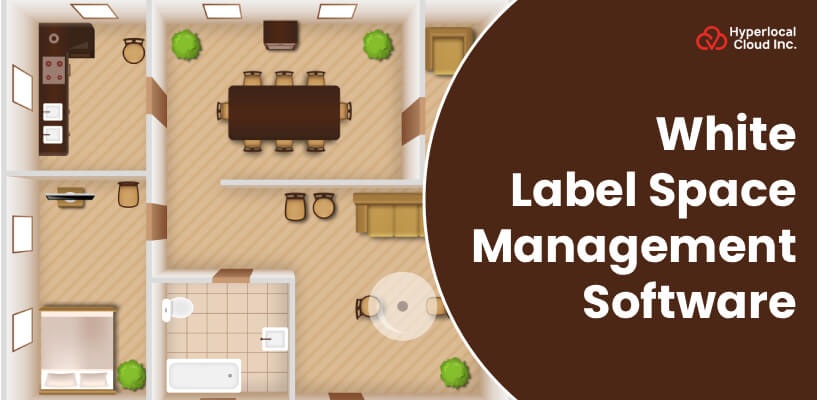White Label Space Management Software

In today’s digitally transforming world, it will become crucial than ever to successfully deal with physical spaces. Whether it’s an office, collaboration area, store, or even a big warehouse, organizations must preserve the way their space is used. This is the situation where the space management software comes in demand.
Space management software is a powerful tool that helps organizations monitor, optimize, and plan the use of their physical areas. It is designed to reduce waste, improve employee productivity, and improve the general experience of those who use the space.
The market for space management software is growing, as the rise of remote control and hybrid work increases, the need for flexible office layouts, and the pressure on smart buildings are all in demand. Enterprises that want to shift quickly, save costs, and make refined decisions about the use of their space can build their own space management software either with a white label solution or from the ground up.
What is Space Management Software?
Space management software is a mobile application that is usually helpful for businesses that plan to monitor and control the use of their vacant space. This software offers a clear-cut overview of how areas such as offices, conference rooms, desks, parking spaces, and storage are used in real time without any burden. It collects data on space coating, ordering plans, movement patterns, and the degree of use. This data helps companies to understand whether their space is underutilized, crowded, or poorly organized.
Transform Your Facility Services with Branded Tech
How Does Space Management Software Work?
Space management software is a useful aspect for businesses that work to automate space management. Here is the detailed information about the working model of the software, which is mentioned below. All you need to do is go through the information once.
1. Data Collection
The system collects data in a variety of ways, including IoT sensors in desks and rooms, employee check-in and access control, or integration with existing systems such as HR databases.
2. Data Processing
The accumulated information is dispatched to a principal platform where its miles are analyzed. The software program identifies patterns and tendencies, together with peak utilization hours or often unused regions.
3. Visualization
Users get smooth-to-understand dashboards, heatmaps, and reviews that show area usage in real-time or historic views. This visual equipment assists managers in seeing problem regions or possibilities.
4. Automation and Alerts
The software program is typically useful for automating the sending of booking confirmations, optimizing cleaning schedules, and alerting managers if specific regions are overcrowded.
5. Integration
The platform restlessly integrates with other systems, which mix facility management, safety, or HVAC control, admitting a superior holistic way to space usage.
Why is Investing in a White Label Space Management Software Beneficial?
Businesses or startups that are looking to start their business journey can utilize a white label solution because these are pocket-friendly solutions that come with a wide range of benefits. So, have a look at the information below to get to know about the benefits of investing in a white label space management software.
1. Cost Efficiency
Developing a software product from the ground up may be luxurious and time-consuming. White label answers are already constructed and examined, which notably reduces development fees.
2. Faster Time to Market
Since the middle software is ready, businesses can release their branded solution quickly, giving them a competitive edge.
3. Customization
White label carriers frequently allow agencies to personalize the interface, functions, and branding to fit their specific needs, making the software sense like their personal product.
4. Focus on Business Growth
Companies can deal with marketing, sales, and customer service without stress regarding technical improvement and protection.
5. Regular Updates
The white label company typically handles updates and enhancements, making sure the software program remains up-to-date with enterprise requirements and personal wishes.
6. Scalability
White label software is designed to deal with growth, so companies can extend their user base or add new features without technical complications.
How to Choose a Reliable White Label Solution Provider?
There are certain factors that play a vital role in the selection of a reliable and trustworthy white label solution provider that provides efficient and robust space management software. Here are the key factors below, with the help of which you can analyze and choose the best white label solution provider.
| Key Factors | Key Responsibilities |
| Experience and Reputation | Look for suppliers with proven experience with space management software. Take a look at customer reviews and case studies. |
| Customization Option | Make sure the supplier provides enough flexibility to tailor branding and functional requirements |
| User-Friendly Interface | The software should be easy for your customers to use without heavy training. |
| Integration Capabilities | The solution should be well integrated with popular workplace tools such as calendar systems, building management, and communication apps. |
| Support and Maintenance | Check if the supplier offers strong technical support and regular updates. |
| Security | Data security is important. Make sure the supplier complies with industry standards and uses strong encryption. |
| Pricing | Pricing should be genuine, enabling businesses or startups to start their business with a budget-friendly mobile app solution. |
The Emerging Core Features of Space Management Software
There are a lot of features that space management software offers in order to facilitate the users. An overview of its emerging core features is discussed below.
1. Real-Time Space Occupancy Monitoring
The software typically uses sensors and IoT units to track real-time space use, helping business managers to smoothly understand coating patterns. This helps to sidestep overpopulation and secure the best designation of places.
2. Room and Desk Booking
Employees and visitors can quickly reserve meeting rooms, desks, or workstations through intuitive ordering systems, often free through stationary or mobile apps. This streamlines strategizing and prevents double orders.
3. Utilization Analytics
Advanced analysis provides insight into how locations are used over time, highlighting trends, hours of top use, and low-use areas. This data-driven insight supports informed decision-making for space planning and cost savings.
4. Floor Plan Visualization
Interactive floor plans provide a visual representation of the space setup and show available rooms, desks, and resources. Users can navigate these plans digitally to easily find and book rooms.
5. Visitor Management
This feature simplifies guest check-in and tracking, improves the security and visitor experience. This often includes pre-registration, marking, and surveillance of real-time visitors.
6. Resource Management
Outside of spaces, the software manages help such as equipment, projectors, and catering services. This ensures that all major equipment is common and ready for meetings or events.
7. Mobile Accessibility
Mobile apps provide access to bookings, alerts, and evaluations, and meet the needs of an increasingly more mobile and peripheral workforce.
8. Integration with Calendar and Communication Tools
Unbounded fusion with platforms such as Outlook, Google Calendar, Microsoft Teams, and Slack helps synchronize orders and facilitate communication around space use.
9. Environmental Controls
Some modern systems make it possible to control lighting, temperature, and air quality in space, refining comfort while supporting continuity plans.
Book a Free Demo of Our White Label Space Management Platform Today!
How are AI-driven Technologies Game-Changing for Space Management Software?
AI app solutions for entrepreneurs are a game-changing aspect of mobile app development. The integration of AI in space management software will transform the application, making it more feature-rich with tech advancements.
1. Predictive Analytics
AI can predict space use patterns rooted in historical data and outward factors such as weather or events, and help firms plan enhancements.
2. Smart Recommendations
AI-powered systems suggest optimal seating or meeting times to maximize space utilization.
3. Automated Space Allocation
AI can dynamically assign desks or rooms based on employees’ preferences, team collaboration needs, or social distance requirements.
4. Enhanced Data Processing
AI algorithms quickly analyze large datasets to detect anomalies or options for cost savings.
5. Voice and Chatbot Assistance
Users can interact with the software through voice commands or chatbots for straightforward ordering and questions.
6. Energy Optimization
The AI approach can modify heating, cooling, and trustworthy-moment lighting to save effort when the space is vacant.
Step-by-Step Process to Develop a Space Management Software
Several steps play an important role in developing space management software. Below are the most compelling ones you can consider for your business.
1. Market Research and Insights
Proper market research with appropriate knowledge will be the plus point for businesses in order to develop their own space management software. An in-depth evaluation of the ongoing market trends and competitors will be helpful for businesses to make a robust application.
2. Design Wireframes and Prototypes
A compelling and visually appealing design is the demand of the users, which provides them with a user-friendly experience. That’s why businesses are required to design the platform as simply as they can, which attracts a large number of users.
3. Development Process
Development is a crucial phase that is divided into custom ones or with a white label solution. First, businesses are required to choose the development method to enter the market with a demanding approach. In general, the development cost to build a white label space management software is around $6,000, which will increase with several factors. However, if businesses choose custom mobile app development solutions, they have to pay more than the estimated cost. So the development process is totally based on the final choice of businesses.
4. Testing & QA
Automatic or manual testing is an essential aspect to ensure that the application is free from unwanted errors, bugs, or glitches. The early detection of the suspected activities will improve the quality of the app.
5. Deployment and Maintenance
The application is ready for launch on different platforms so that users can conveniently download the app for their devices, such as iOS and Android. Once the app is launched, businesses are required to analyze user feedback to further improve the app.
The Tech Stack Involved to Build a White Label Space Management Software
A list of tech stacks that are used to build a white label space management software is mentioned in the table below. Just check it out:
| Category | Tech Stack |
| Frontend | React, Angular, or Vue.js |
| Backend | Node.js, Python (Django/Flask), or Java Spring Boot |
| Database | PostgreSQL, MySQL, or MongoDB |
| Cloud Platforms | AWS, Microsoft Azure, or Google Cloud |
| IoT Integration | MQTT, Bluetooth Low Energy (BLE), or Zigbee |
| APIs | RESTful or GraphQL APIs |
| AI/ML Tools | TensorFlow, PyTorch, or AWS SageMaker |
| Security | OAuth 2.0, JWT, and SSL/TLS |
Use Cases of Space Management Software
A robust and advanced space management system is a versatile software in a digital world that is in demand because of its top-notch functionalities. So here are all the essential use cases, which are discussed below.
1. Corporate Offices
The system optimizes the allocation of the work area for employees, supports hybrid work models, and minimizes property costs by maximizing existing space.
2. Co-working Spaces
By utilizing the software, the co-working spaces are able to adjust the membership involvement and streamline the management of shared supplies.
3. Retail Stores
This service helps to manage back-office areas, staff rooms, and customer areas, improve operating efficiency, and storage planning.
4. Healthcare Facilities
With the help of space management software, healthcare professionals supervise patient rooms, consultation rooms, and equipment, and ensure even workflow and compliance with safety standards.
5. Event Venues
The software is useful in order to coordinate arena booking, resource allocation, and visitor flow for conferences, exhibitions, and other major events.
Unleash the Future Trends of the Space Management Software
As the growth of space management software is at its peak, it will definitely grow in the future with the latest tech advancements, which make the software more efficient and user-friendly. Have a look at the information below to understand the future trends of the software.
1. AI and Machine Learning Use
AI-driven assessment will provide predictive discernment into space use and automate property management for maximum economy.
2. IoT Expansion
A successful IoT expansion with automated sensors will more effectively enhance the real-time monitoring and data integrity of vacant spaces.
3. Augmented Reality and Virtual Reality
The AR/VR technologies typically manage the space through virtual trips and remote cooperation. This approach is helpful and effective; it immediately facilitates the users.
4. Sustainability Focus
The software will increasingly support green initiatives by monitoring energy use and promoting environmentally friendly space use.
5. Remote and Hybrid Work Support
The features will adapt to the hybrid model, so that seamless ordering and management, and flexible schedules are available in several places.
6. Blockchain for Data Security
Digital ledger technology will certify transparent, tamper-resistant data handling and record transactions in the space management routine.
Want to Offer Smart Space Management Under Your Brand?
How to Make Money from Space Management Software?
Numerous ways are listed that help businesses make money from the space management software. But only the relevant and essential ones are discussed below, so that businesses can consider them in order to achieve a high ROI.
1. Subscription Model
The subscription model allows you to charge users on a monthly or annual basis for access to the software, often with layered pricing based on features or the number of users.
2. Freemium Model
Provide a basic version of the software for free while loading premium features, higher use limits, or advanced analysis.
3. Setup and Customization Fees
Generate revenues from initial implementation, system adaptation, and integration services adapted to customer requirements.
4. Usage-Based Pricing
Checking customers based on actual software use, such as the number of orders, active users, or data consumption.
5. Consulting Services
Provide expert advice on space optimization, workplace strategy, and best practices for software as an extra paid service.
6. Add-on Modules
Provide optional functions or integrations as an addition, so that customers can expand their abilities without full upgrading.
Wrapping Up!
White label space management software offers companies a great opportunity to enter this growing market rapidly and cost-effectively by labeling and adapting existing software. As technology advances, especially with AI and IoT integration, space management software will become even more intelligent and powerful. Whether you are a business that wants to optimize your own space or a supplier who wants to offer space management solutions, investing in this technology is a smart choice for the future. To know more, just feel free to get in touch with Hyperlocal Cloud, a leading custom software development company.





